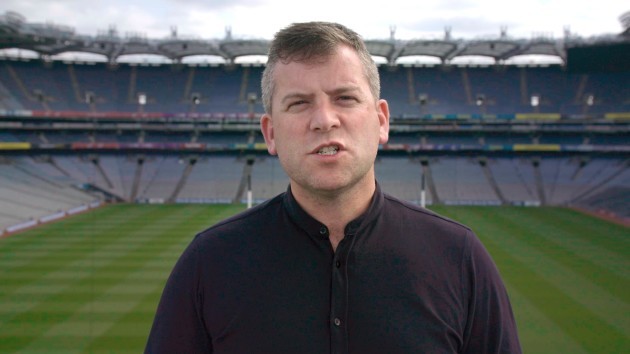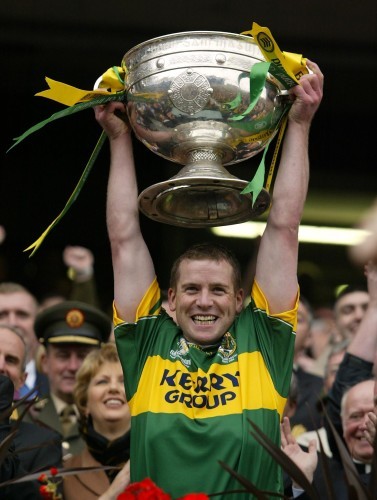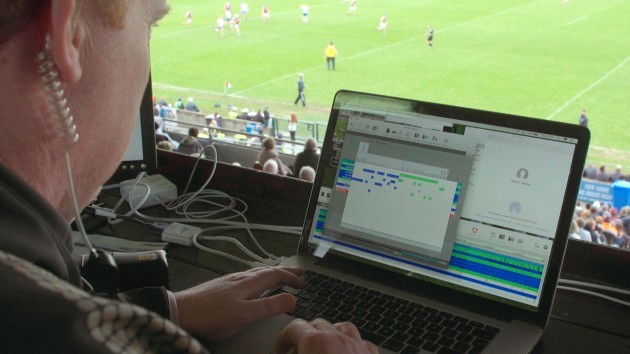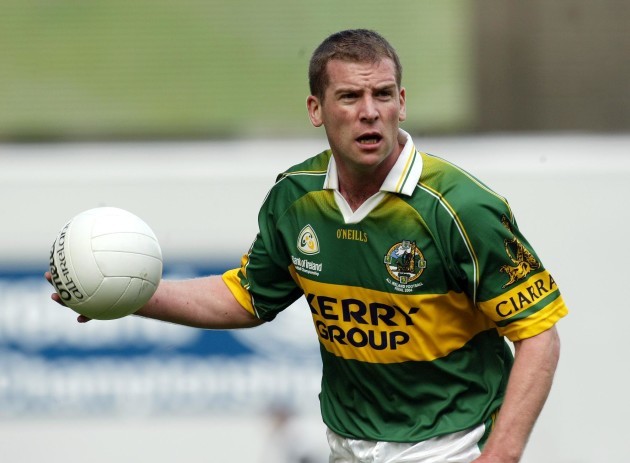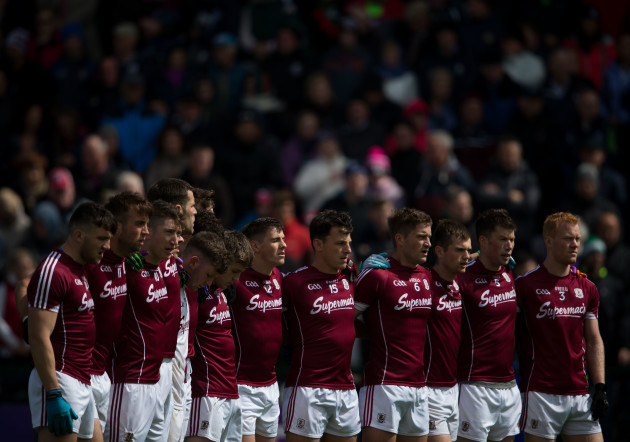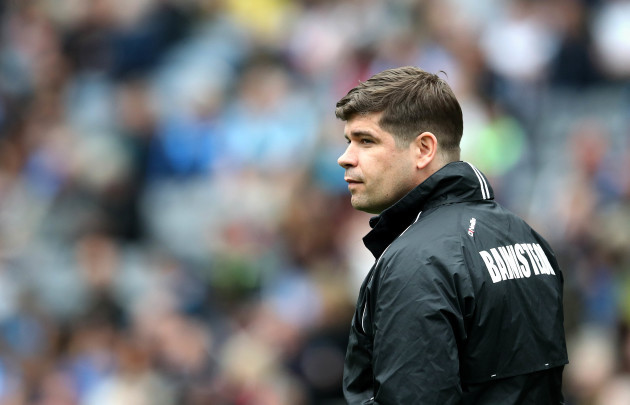IT’S BEEN TWELVE years since Dara Ó Cinnéide donned the green and gold of Kerry at inter-county level.
He made his debut for the Kingdom’s senior side in 1994 and three All-Ireland titles would follow, including one as captain in 2004 when the An Ghaeltacht forward led his teammates to glory and lifted Sam Maguire.
Since he played his last inter-county match and hung up his boots in 2005, one thing is for certain — Gaelic games, across all codes, have changed significantly.
Science, technology, education and data are all being used more and more in the quest for improved performance across the board.
The big question is though, are these changes positive? Are they for the better, or is the quality of the game itself being lost?
GAA Nua is a new series starting on RTÉ on Monday night, in which Ó’Cinnéide explores the modern game and what has changed since he parted ways with his inter-county days.
“It’s kind of a curiosity that’s been satisfied more than anything else,” he tells The42.
“It’s just something that in the last two years or so, I’ve been hearing a lot of and people have been hearing a lot about how much the game has changed.
“It kind of started bugging me a while back, saying ‘I know it’s changed, I can see that on the field, but how?’
“I came into this a bit cynically in a way. You would have been saying, ‘Ah yeah, it’s changed, but is it for the better?’ Everyone is saying, ‘We need to stop talking about the game as if it was the same as when we played it.’
“I get that and I have no problem with that. I’m involved in club management myself and I understand that.
“We just wanted to see where the new changes were coming from apart from the people — what tools and what aids are we using to analyse the game, to recover from injury, to prepare players — to do all of these things that we were hearing about that I personally didn’t have a whole lot of experience of by the time I had finished up playing at inter-county level.”
The four-part series — which is directed Pat Comer, former Galway footballer and writer and director of the highly regarded documentary A Year ‘Til Sunday — will see Ó Cinnéide chat to former and present players, managers, scientists and others about the technological and scientific advances which have come to the fore over the past few years.
GPS, statistics and analysis are among some of the contemporary initiatives which will be looked at.
A selector with his home club An Ghaeltacht, Ó Cinnéide admits that he may not be as up to scratch with these changes, but he welcomes them.
“We don’t use a whole lot of science [with An Ghaeltacht] because first off, we wouldn’t have a big budget to pay for some of the stuff, and two, we have a lot of good people on the sideline who trust their instinct.
“But I wouldn’t be slow to turn towards modern technological tools if I thought it would improve the team a bit more. I’m still very much of the old school analysis type — watch the DVD, rewind it, play it, make notes.
“Whereas Tomas O’Coyle of the Waterford hurlers who has taken part in this documentary is very much the laptop, the Hudl app. I can see the benefit. It’s time-saving basically, for the players and for the management and selectors involved on the sideline.
“It’s still the same game that’s being played but it’s just being processed a different way. That’s probably the best way of putting it.”
In terms of the series itself, Ó Cinnéide says that experiencing the modern methods first hand was eye-opening to a certain level, but across the board, one common denominator remains from his own time in the inter-county jersey.
“There was a certain amount of eye-opening there,” he continues.
“I felt that the common message that was coming across from all of those people we were talking to is, ‘Yes, all of these tools are available to you that might not have been there in the last decade, and they’re all providing huge amounts of information and data, but really it still comes back to the human element — the interpretation of that data, what you do with all of that information.
“It depends on the management involved and in charge, and how much stock they place in it. Between camogie, ladies football, men’s football and hurling, it depends on who’s on the sideline and who’s embracing this.
“Who trusts their own instinct at management and who is looking for that 1%, 2% extra, that they armed with this data and information and what they’re doing with it.
“It really is refreshing for an old school traditionalist like myself to see that the human on the sideline is still the most important element.”
One example he draws on is an app which is now available for the use of both players and managers.
The player can enter data on how they’re feeling on a particular day, and management can the subsequently make decisions regarding training and matches based on the information they receive.
Ó Cinnéide feels that this is a positive step, and would have openly welcomed it in his own playing days.
“If we rocked up to training long ago and told the manager, ‘I’m not feeling great,’ the answer would have been, ‘We need to train harder, we need to do more, you’re not fit,’ or something like that.
“Whereas now, if somebody says, ‘I’m not feeling great,’ there’d nearly be an investigation — ‘Why are you not feeling great?’ — and there’s information ready and available at the touch of a finger saying, ‘That’s kind of self-explanatory, look, there’s obvious reasons why you’re not feeling great. You might just take the session off tonight.’
“I would view that always as a positive thing. I wasn’t the greatest athlete in the world myself when I was playing — I would have liked individualisation and I would have liked that information to have been available when I was playing so that decisions could have been made a lot smarter.
“This is no reflection on the people that we trained with or for or under, but we did train an awful lot of stupid training, whereas now I think they’re training a lot smarter with a lot more purpose, and that can only be a good thing.”
He stresses that the series is tilted more towards the GAA side of things rather than science-centred.
“We tried to avoid being in white jackets with lab spectacles. We tried to make it as GAA centred as we could.
It’s just an exploration of an element of the game that we all see and recognise and watch. It’s more dressing room based than pitch side-based and lab-based.
During the eight months or so of recording, one thing that really surprised Ó Cinnéide was the level of access he and his team were granted when observing various camps.
From the Galway senior footballers to Kerry manager Éamonn Fitzmaurice, the Waterford hurlers to the Dublin ladies footballers, they were pretty much given access all areas to training grounds, dressing rooms and match day situations.
“You’re meeting people who would have opinions on the matter, good or bad. I think the big strength of this is the access we got.
“There are a lot of very recognisable GAA faces in it, I won’t say the usual suspects, but people that would have opinions on the matter.
“I think the biggest thing is that there was that open door policy, which surprised me. We all know that inter-county teams like respect in their dressing rooms.
“We’re not doing anything to disrupt the sanctuary of the dressing room but we were very grateful to a lot of people for allowing us a sneak preview to what does go on behind the scenes, which we wouldn’t normally get, so I’m kind of excited about it.
“They were very open with us. It will be nice for the viewers to see something that they wouldn’t normally see.”
They even got to follow Mayo full back Kevin Keane into the operating theatre in Santry Sports Clinic and on to his road to recovery, as he bounces back from a cruciate injury.
“Obviously, we can’t show everything,” he says. “But it was seriously gripping, and even to watch him on his road to recovery and the heartbreak that an injury involves.
“He was very, very open, and willing and trusting of us, and we really appreciated that. That kind of access is just priceless.”
At the end of the day, what does Ó Cinnéide think of the changes overall?
“By and large, I think it’s positive. I think the game is evolving, it might help explain the evolution of the game. There’s so much time, technology and effort invested in it.
“I’m very much a traditionalist and as I said, I came to this almost cynically — I ‘d like to think I was as open-minded as I could be — but I was convinced by certain aspects.
“Thankfully I think at the end of it, the key message was that all these advances are great, they’re all very positive, they are a good thing. Science is, by nature, there to prove or disprove your own opinions, but it’s your own opinions that are important, first and foremost.
“Thankfully, that element of it is still there. There are managers on the sideline still using instinct, and still going completely with that. But, I wouldn’t decry in any way a manager who would embrace the technology, embrace all the modern tools available to him if he thought that that would improve a team by the slightest percentage.
“By and large, I think it’s a good thing, but I think people can get too bogged down in that as well.
“They’re short enough programmes, so I would say to people, ‘Leave it until programme number four before you judge it,’” he grins.
GAA Nua, a new sports series in Irish, starts on RTÉ One on Monday, 19 June at 7.30pm, and will be broadcast for the three following Mondays.
The42 is on Instagram! Tap the button below on your phone to follow us!
